BBC 'should improve local and World Service news'
- Published

BBC News director James Harding said the BBC must 'deliver on its mission to inform beyond broadcasting'
BBC News should increase both its local and global coverage and improve its digital services if it is to remain relevant, the corporation has said.
The BBC should "do more to provide local news that properly serves all parts of the UK", according to a report titled The Future of News, external.
It should also reverse the trend for closures to World Service language operations, the report said.
That could include opening new stations for countries like North Korea.
BBC News director James Harding said the need for the corporation to keep the public informed in an "exciting, uneven and noisy internet age" was "greater than ever".
"The BBC is going to have to think about how to deliver on its mission to inform beyond broadcasting," he said.
"It has a singular responsibility to provide the best quality global news coverage to people in the UK and audiences who sorely need it around the world."
He said local news was suffering due to the decline of regional papers, at a time when devolution was shifting power away from Westminster.
"The BBC needs to consider how it can better serve people in the cities, the regions and the four nations of the whole of the UK," said Harding.

The corporation closed five World Service language operations in 2011
The Future of News report attempted to set out how BBC News would meet future challenges.
The report said the corporation must cater for a generation that does not watch, listen to or read news in traditional ways, and must cut through the "noise" online.
"The internet is not keeping everyone informed, nor will it," it said.
"It is, in fact, magnifying problems of information inequality, misinformation, polarisation and disengagement. Our job is keeping everyone informed."
The internet has forced many major news organisations to make cutbacks, meaning "vast swathes of modern life are increasingly unreported or under-reported", it added.
'Failing' journalism
That includes local news in the UK. "It can be argued journalism is failing people where it matters most, namely where people live and work," the report said.
"Parts of the country are not properly reported; in others, public services and people in power are not effectively held to account."
As a result, the report continued: "The BBC is going to have to make the most of digital services, alongside radio and television, to ensure people have the information they need where they live and work."
But publishers disputed the suggestion that local journalism had fallen short.
"Local journalism is not failing," said Santha Rasaiah of the News Media Association, which represents news publishers across the UK.
She said local papers and their websites reached 73% of the population - "bigger overall audiences than ever before" - and were "at the heart of their local communities, championing their readers, campaigning in their interests, changing the law".
She added: "The industry has stressed repeatedly over many years that the licence-fee-funded BBC must not do anything that could damage the commercial independent news media industry and its ability to perform this vital role."
The BBC "has yet to deliver" on promises to consider ways of working with local publishers, such as the BBC's purchase of local media content, she said.
'Less free expression'
Meanwhile, the BBC's report said said the World Service "faces a choice between decline and growth".
Five World Service language operations were closed in 2011. The BBC took over the cost of the World Service from the Foreign Office last April.
"If the UK wants the BBC to remain valued and respected, an ambassador of Britain's values and an agent of soft power in the world, then the BBC is going to have to commit to growing the World Service and the government will also have to recognise this," the report said.
"It will mean reversing the trend of closing language services and, with an eye to audiences of need, opening new ones."
As well as "looking at how we can develop a service that might work for North Korea", the corporation is also "increasingly reflecting on the position of the media in Russia and Turkey", it said.
The report added: "In many parts of the world, there is not more free expression but less."
Last July, Mr Harding announced plans to cut 415 jobs in BBC News as part of £800m efficiency savings following the freezing of the licence fee in 2010.
- Published28 January 2015

- Published9 December 2014

- Published1 October 2014

- Published17 July 2014

- Published17 July 2014

- Published31 March 2014

- Published14 January 2014
